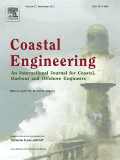
COASTAL ENGINEERING
Scope & Guideline
Exploring Multidisciplinary Insights in Coastal Engineering
Introduction
Aims and Scopes
- Coastal Hydrodynamics:
Research encompassing the dynamics of water movement in coastal areas, including wave propagation, tidal currents, and the interaction of waves with structures. - Sediment Transport and Morphodynamics:
Studies on the processes of sediment movement and the resulting changes in coastal morphology, focusing on both natural and anthropogenic influences. - Coastal Structures and Engineering Solutions:
Evaluations and designs of coastal structures such as breakwaters, seawalls, and other forms of coastal protection, along with their impact on the environment. - Climate Change and Coastal Resilience:
Investigations into the effects of climate change on coastal regions, including rising sea levels, storm surges, and strategies for enhancing coastal resilience. - Data-Driven and Computational Modelling:
Utilization of advanced computational techniques and machine learning approaches to model coastal processes and predict outcomes under various scenarios. - Environmental Impact Assessments:
Studies assessing the ecological impacts of coastal engineering projects and natural processes, aiming to balance development with environmental preservation.
Trending and Emerging
- Machine Learning and AI Applications:
An increasing number of studies utilize machine learning and artificial intelligence to enhance predictive modeling of coastal processes, reflecting a trend towards data-driven approaches. - Nature-Based Solutions:
There is a growing emphasis on integrating natural systems into coastal engineering, focusing on sustainable practices like the use of vegetation and natural barriers. - Integrated Coastal Zone Management (ICZM):
Research highlighting the importance of holistic management strategies that consider environmental, social, and economic factors in coastal planning is becoming more prominent. - Resilience and Adaptation to Climate Change:
Papers exploring adaptive strategies to enhance coastal resilience against climate change impacts, such as sea-level rise and increased storm intensity, are increasingly featured. - Real-Time Monitoring and Forecasting Technologies:
The adoption of innovative monitoring technologies and real-time forecasting systems for coastal hazards and processes is on the rise, driven by advancements in sensor technology and data analytics. - Ecological Impacts of Coastal Engineering:
Emerging research focuses on understanding the ecological consequences of coastal interventions, aligning engineering practices with environmental conservation goals.
Declining or Waning
- Traditional Coastal Engineering Methods:
There has been a noticeable decline in publications focused on conventional engineering design methodologies, as the field shifts towards more innovative and adaptive approaches. - Single-Factor Studies:
Research that examines coastal processes in isolation, without considering the complex interactions between multiple factors, is becoming less common as the field emphasizes integrative studies. - Static Coastal Protection Solutions:
The focus on static, hard-engineering solutions is waning in favor of more dynamic and nature-based approaches that consider ecological resilience and adaptability. - Historical Coastal Studies:
Research centered on historical analyses of coastal changes is declining as attention shifts toward predictive modeling and future-oriented studies.
Similar Journals
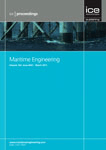
PROCEEDINGS OF THE INSTITUTION OF CIVIL ENGINEERS-MARITIME ENGINEERING
Exploring Innovations in Maritime Practices.PROCEEDINGS OF THE INSTITUTION OF CIVIL ENGINEERS-MARITIME ENGINEERING, published by Emerald Group Publishing Ltd, is a leading journal in the field of Maritime Engineering. With a reputable ISSN of 1741-7597 and an E-ISSN of 1751-7737, this journal has established itself as a cornerstone for researchers, professionals, and students keen to explore the complexities of ocean engineering. Operating primarily from the United Kingdom, it has made significant contributions to the advancement of the maritime industry since its inception, covering research from 2001 to 2024. The journal currently holds a Q3 ranking in Ocean Engineering as classified by Scopus, where it ranks 21st among 105 journals in the category, placing it in the 80th percentile, which highlights its influence and relevance in contemporary marine research. Through a rigorously peer-reviewed process, the journal publishes innovative and high-quality articles that encompass broad aspects of maritime engineering, including design, construction, and sustainability, thus serving as a vital resource for those engaged in this dynamic field. By fostering dialogue among professionals and providing access to cutting-edge research, the PROCEEDINGS OF THE INSTITUTION OF CIVIL ENGINEERS-MARITIME ENGINEERING continues to shape the future of maritime engineering practice and education.

OCEAN DYNAMICS
Advancing Knowledge in Ocean DynamicsOCEAN DYNAMICS is a premier peer-reviewed journal published by Springer Heidelberg, dedicated to advancing the field of oceanography. With an ISSN of 1616-7341 and an E-ISSN of 1616-7228, the journal has established itself as a key resource for researchers and professionals interested in the dynamic processes of the world's oceans. As of 2023, it holds an impressive Q2 category ranking in Oceanography, placing it among the top journals in its field (Rank #34/145, 76th percentile in Earth and Planetary Sciences). Although operating under a traditional publishing model without open access options, OCEAN DYNAMICS continues to provide valuable insights and a platform for innovative research, boasting coverage from 2001 to 2024. Researchers and students alike will benefit from this journal's commitment to showcasing cutting-edge studies that enhance our understanding of oceanographic phenomena.

Indian Journal of Geo-Marine Sciences
Innovating Insights into Marine Ecosystems and GeologyThe Indian Journal of Geo-Marine Sciences, published by the NATIONAL INSTITUTE OF SCIENCE COMMUNICATION & INFORMATICS (NISCAIR), serves as a vital platform dedicated to the dissemination and advancement of knowledge in the field of marine and geosciences. As an open-access journal, it allows for improved visibility and accessibility of research findings to a global audience, enabling researchers, professionals, and students to share insights into oceanography and related disciplines. With a publication history spanning from 2007 to 2010 and continuing from 2012 to 2024, it has established itself within the academic community as a reliable source of innovative research, despite being classified in Q4 of Oceanography and holding a Scopus rank that places it in the 27th percentile. This journal is particularly relevant for those investigating marine ecosystems, geological oceanography, and their interconnections, thus playing an essential role in fostering understanding and communication within this important area of scientific inquiry.

Water Waves
Exploring the Dynamics of Water WavesWater Waves is a leading academic journal dedicated to advancing research in the fields of analysis, applied mathematics, computational mathematics, and modeling and simulation. Published by SPRINGERNATURE, the journal has positioned itself as a vital resource for researchers and professionals who are exploring the dynamic behaviors of water waves and their applications across various scientific disciplines. With an ISSN of 2523-367X and an E-ISSN of 2523-3688, the journal provides a robust platform for disseminating high-quality research findings, featuring works that reflect innovative methodologies and significant contributions to the understanding of water dynamics. With its publication corridor extending from 2019 to 2024 and achieving a commendable Q2 quartile ranking in multiple mathematics categories for 2023, "Water Waves" emphasizes its commitment to fostering scholarly excellence. Despite its evolving status, the journal remains accessible to a wide audience, underscoring its significance in shaping the discourse in its respective fields, while also providing vital insights and fostering collaboration among researchers, academicians, and students alike.
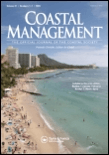
COASTAL MANAGEMENT
Bridging theory and practice in coastal management.COASTAL MANAGEMENT is a distinguished journal published by Taylor & Francis Inc, specializing in the interdisciplinary field of environmental science with a focus on coastal ecosystems. Since its inception in 1987, this journal has provided a critical platform for researchers and practitioners to disseminate innovative studies and practical solutions related to coastal management challenges. With an impressive Q2 ranking in both Environmental Chemistry and Environmental Science categories, it is recognized for its significant contributions to the field, evidenced by its Scopus ranking of #61/233 in General Environmental Science and #60/147 in Environmental Chemistry. Although open access options are not available, the journal maintains a broad readership within the academic community through its comprehensive exploration of coastal issues. With a commitment to advancing knowledge and fostering collaboration among experts, COASTAL MANAGEMENT plays a pivotal role in shaping sustainable practices and policies essential for the conservation and stewardship of our vital coastal environments.
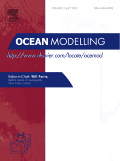
OCEAN MODELLING
Unlocking the Secrets of Our Oceans Through Modeling.OCEAN MODELLING, published by Elsevier Science Ltd, is a leading journal dedicated to advancing the understanding of ocean systems through innovative modeling techniques and interdisciplinary research. With an ISSN of 1463-5003 and E-ISSN 1463-5011, this journal is esteemed within the fields of Atmospheric Science, Computer Science (Miscellaneous), Geotechnical Engineering and Engineering Geology, and Oceanography, as reflected by its impressive quartile rankings in 2023, including Q1 in Oceanography and Q1 in Computer Science. Researchers and professionals benefit from the journal’s high-impact contributions, as indicated by Scopus rankings that place it among the top-tier publications in its categories. Although not an open-access journal, OCEAN MODELLING provides essential insights and methodologies crucial for both academic and practical applications, facilitating knowledge transfer and innovation among marine scientists, engineers, and policy-makers engaged in vital ecological studies and technological advancements regarding our oceans. Join the forefront of marine modeling research by contributing to and exploring the wealth of knowledge presented in OCEAN MODELLING.
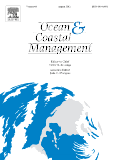
OCEAN & COASTAL MANAGEMENT
Exploring the Depths of Aquatic ScienceOCEAN & COASTAL MANAGEMENT is a premier journal dedicated to the multifaceted fields of oceanography, aquatic science, and coastal management. Published by ELSEVIER SCI LTD and located in the United Kingdom, this esteemed journal boasts a remarkable Q1 ranking in prestigious categories, including Aquatic Science and Oceanography, reflecting its influential contributions to the field since its inception in 1992. The journal is recognized for its high impact, boasting a commendable presence in Scopus rankings across related disciplines, with notable placements in the 94th percentile for Aquatic Science and 92nd percentile for Oceanography. Although it operates under a subscription model, OCEAN & COASTAL MANAGEMENT continues to serve as a vital resource for researchers, professionals, and students seeking to advance their understanding of coastal ecosystems and effective management strategies. Through rigorous peer-reviewed research, the journal aims to foster knowledge exchange and practical applications in policy-making and environmental stewardship, making it an essential read for anyone engaged in the preservation and sustainable use of oceanic resources.
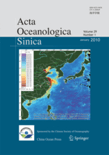
ACTA OCEANOLOGICA SINICA
Fostering Global Collaboration in OceanographyACTA OCEANOLOGICA SINICA, published by SPRINGER, stands as a significant voice in the fields of Aquatic Science and Oceanography, contributing vital research and insights since its inception in 1985. With an ISSN of 0253-505X and an E-ISSN of 1869-1099, this journal maintains a strong international focus, delivering high-quality peer-reviewed articles that address pressing marine and freshwater environmental issues. Although it operates under a subscription model, its Q3 ranking in both Aquatic Science and Oceanography demonstrates its solid standing within Scopus, placing it in the 48th and 44th percentiles respectively. The journal aims to foster knowledge exchange and collaboration among researchers, professionals, and students by providing a platform for innovative studies and comprehensive reviews. With a dedicated editorial board and a commitment to advancing scientific understanding, ACTA OCEANOLOGICA SINICA serves as an essential resource for anyone engaged in the study of oceanographic phenomena and aquatic ecosystems.

GEO-MARINE LETTERS
Advancing Knowledge in Marine and Geological ResearchGEO-MARINE LETTERS, published by Springer, is a prestigious academic journal that has been a pivotal platform for the dissemination of innovative research in the fields of Earth and Planetary Sciences, Oceanography, Environmental Science, and Geotechnical Engineering since its inception in 1981. With an E-ISSN of 1432-1157, this journal has established itself in the Q2 quartile across multiple categories in 2023, indicating its influential position within the scientific community, as reflected by its Scopus rankings. While it currently does not offer an open access option, its rigorous peer-review process ensures the publication of high-quality research that contributes significantly to advancing our understanding of marine and geological sciences. Researchers, professionals, and students alike will benefit from the diverse scope of studies featured in GEO-MARINE LETTERS, making it an essential resource for those engaged in environmental and marine research. Situated in Germany, the journal's commitment to excellence continues to shape critical discussions and innovations in the field.

Anthropocene Coasts
Empowering Research for a Sustainable Marine FutureAnthropocene Coasts is a pivotal peer-reviewed journal published by SpringerNature, dedicated to advancing the interdisciplinary understanding of coastal systems in the context of the Anthropocene epoch. Since its inception in 2018, the journal has focused on critical issues at the intersection of Nature and Landscape Conservation, Ocean Engineering, Oceanography, and Waste Management and Disposal, achieving an impressive Q2 ranking in all these categories as of 2023. With a country of origin in Canada, this journal not only addresses significant environmental challenges, but also promotes innovative solutions and sustainable practices that resonate globally. Researchers, professionals, and students engaged in marine science, environmental studies, and engineering will find valuable insights and cutting-edge research disseminated through this open-access platform. By fostering collaboration and knowledge-sharing, Anthropocene Coasts empowers its audience to contribute to the sustainable management of coastal environments in an era of rapid change.